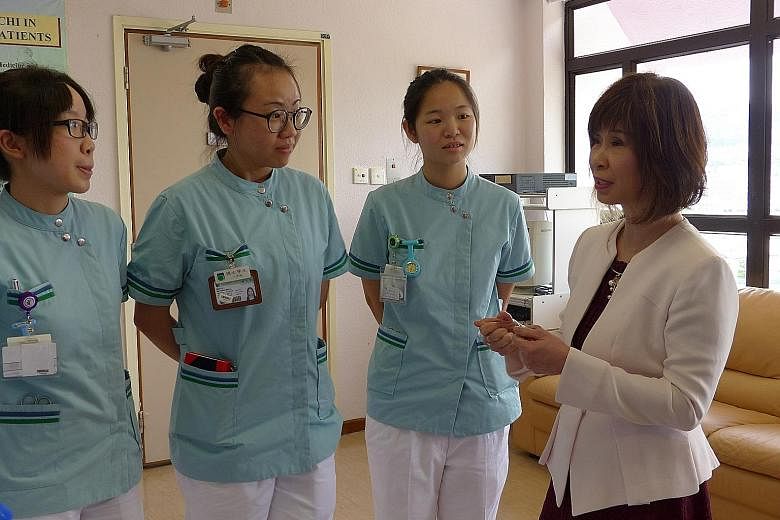HONG KONG • A two-day study trip to Hong Kong has reaffirmed Singapore's move to develop community nursing to cope with an ageing population amid a manpower crunch, said Senior Minister of State for Health Amy Khor.
Singapore can learn from how community nursing, which was started in 1967 in Hong Kong, has evolved over the years, from simple care in the homes to sub-acute care services.
As Singapore looks into developing community nursing, the Hong Kong trip was instructive as it showed how Singapore can build up the "competencies and core capabilities of our community nurses", said Dr Khor in an interview from Hong Kong on Tuesday.
"This will help us in determining the type of training and education, as well as how we can design the community nursing teams. The Regional Health Systems with their regional presence will be best placed to initiate and drive this," said Dr Khor, who visited public hospitals in the New Territories East Cluster on Monday and Tuesday.
In March, Dr Khor said with healthcare shifting away from acute hospitals and into people's homes, the Ministry of Health is looking for ways to get nurses to follow suit. Currently, only 4,900 of Singapore's 34,000 or so practising nurses are in the community care sector. The ministry aims to add 900 more by 2020.
Dr Khor said the trip reaffirmed the belief that "nursing really can play a pivotal role in leading care transformation. And that is in anchoring care in the community so that we transform care from one that is being very acute-centric to one that is person-centric, population-based".
To attract people to join the nursing profession, Dr Khor said there will be opportunities for community nurses in career progression and rotation in an acute-care setting, so that they can update their skills. The ministry is also looking at implementing flexible working hours across all hospitals.
Like Singapore, Hong Kong's government warned that the city will face a critical manpower shortage in the next decade. A study released by the government two weeks ago said the city will face a shortfall of 1,669 general nurses in 13 years.
Dr Khor said community nursing in Hong Kong is largely driven by the hospital clusters, which is what Singapore is looking into.
She said the ministry is looking at having several community nursing teams in the three integrated clusters that serve the different geographical regions, and each team will have between 10 and 15 nurses.
"We are looking at probably having more than 200 (for the three clusters) of these community nurses being housed and, of course, driven from the Regional Health Systems by 2019," said Dr Khor.
Besides understanding how community nursing is practised and integrated within the regional clusters in Hong Kong, Dr Khor also saw how nurses in Hong Kong are highly respected. "In Hong Kong, the nurses are almost all locals. And I think they say that the places in universities are always oversubscribed. Parents apparently have very high respect for the nursing profession, and many parents actually do encourage their children to join the nursing profession," she said.


